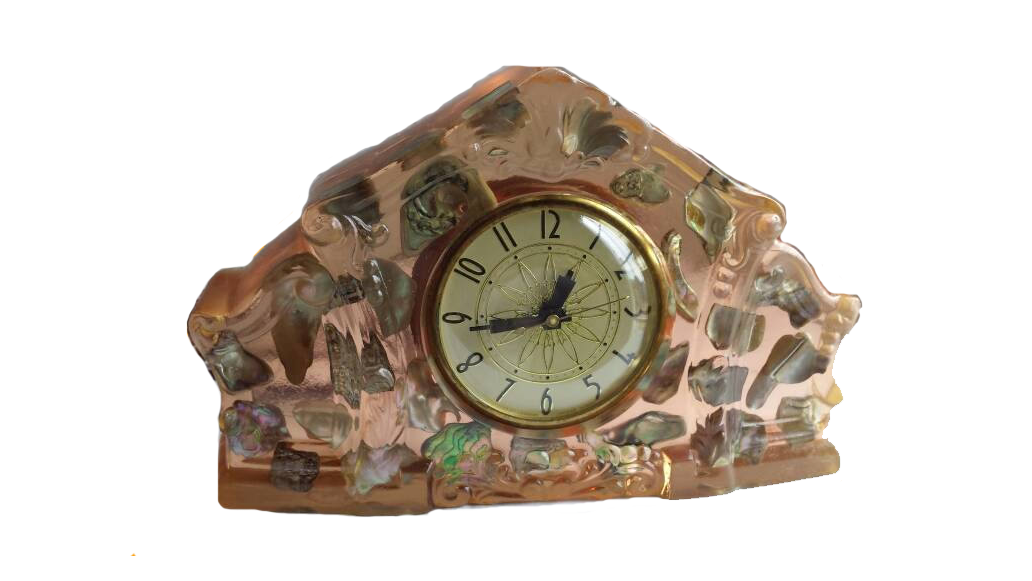Vomit Clock Museum Blog & Resources
Please enjoy the Museum resources. All posts may be updated when new information is discovered. Sign up to be notified when new posts are made.The In-Depth Vomit Clock Overview

Vomit Clocks: An Overview & FAQ
What is a Vomit Clock? VOMIT CLOCKS!, a popular Facebook group, defines vomit clocks as: VOMIT CLOCKS was a 1960/70s mid-century craft trend where one incorporated rocks or other items (dead insects, dried plants, glitter, shells, ect) into a mold (clock, animal,...
The Vomit Clock Museum Posts & Archives
Vlog Feature: Vomit Clocks: History’s Worst Resin Art Trend EVER?
Visitors of the Vomit Clock Museum are likely to be enthusiasts of this art form, but for most folks, vomit clocks are not the most visually appealing way to tell the time. For others, vomit clocks are an acquired taste. Squidlicks talked about vomit clocks in her...
The Care and Keeping of Vomit Clocks
Though we might scour second places like thrift stores and online vintage shops to buy ourselves the most striking and unique vomit clock, the difficult part about acquiring a vomit clock isn’t just simply whether one finds a clock that they like or admire, but how...
Lanshire Clock Movements Assembly Guide by Norko
Like all clocks, vomit clocks rely on complex clock movements, mechanisms made from small pieces of machinery and a motor, to keep the clock running and telling time. These movements were typically supplied by the Lanshire Clock and Instrument Corporation, made from a...
The Story of One Vomit Clock Mold
Though each vomit clock is certainly unique and striking, varying widely between colors and decoration choices; each vomit clock relies on one simple thing for its creation: a mold. These molds, that the artist pours resin into to create a hardened shape to be filled...
History of Lanshire Clock and Instrument Corporation
Vomit clocks, individually distinct, often vary drastically in style and presentation. Some are filled with rocks and others glass, some are bold colors while others take more muted tones, and some take the traditional clock shape while others are fashioned into...
The Six Most Popular Vomit Clock Shapes
1. The Children’s Classic Vomit Cogsworth, is that you? Though the resemblance is strong, you probably won't catch this guy hanging out with Lumiere or Princess Belle. We’re gonna go out on a limb here and say that the french were not, are not, and probably will...
The History of Holland Molds
In 1900s Austria, a young man working at a tile company named Frank Hollendonner learned how to make ceramic molds for pouring tiles. This young man would soon make his way from Austria to New Jersey, expanding his talent for mold making into ceramic molds used for...
Peak’s Craft and Paints: The Resin Clock Makers
Outside a small craft store in Birmingham, Alabama, a man pours plaster molds in a makeshift plant of rough sheets of plywood on top of dusty sawhorses. These plaster molds, soon to be distributed around the country and designed for the typical ceramic vases or...
Rare 3 Piece Vomit Clock with Matching Figurines
When Windy J. first saw this rare set - a vintage resin clock (a "vomit" clock) with MATCHING resin owl figurines - they thought "these are either the ugliest items or the most unique items I have ever seen!" And it's true - vomit clocks often inspire these types of...
The Different Types of Resin
Resin is a solid or highly viscous substance of plant or synthetic origin that can usually be converted into polymers. They are usually made of organic compounds, and resin that is naturally-sourced comes from plants. Plants secrete resin in response to an injury,...
The Strange History of Orgone Resin
Orgone resin, unlike lucite, has a long and complicated origin story. Get ready for a wild ride. In the 1930s, an Austrian doctor of medicine and a psychoanalyst named Wilhelm Reich discovered--supposedly--an “all-permeating cosmic life force” that he called orgone....
The History of Lucite
Lucite, one of the trade names for the chemical compound polymethyl methacrylate, also known as acrylic, acrylic glass, or plexiglass, is a fascinating material used in a startling variety of ways. The compound is a transparent thermoplastic that is used as an...
The Vomit Clock Gallery
The Vomit Clock Gallery is a user-generated gallery of vintage resin clocks. Please reach out to the Museum if you'd like to submit your own clock to the gallery!
Submit a Vomit Clock photo!
The Vomit Clock museum wants YOU to submit a picture of your vomit clock! Photos submitted will be posted in a grid on the website and may be shared on social media. By including a location where you found the clock, we are hoping to pinpoint where the vomit clock...
Ceramic Kit Clocks in the 1950s
Using pre-made clock parts, and a mold or form, kit clocks were a way for the crafter or ceramicist to make a clock at home. Shown below is an advertisement from the April 1959 Issue of Ceramic Monthly, which includes a reference to Lanshire Clock & Instruments...
Lanshire Corporation & Build O’ Clock Copyright Information
The Vomit Clock Museum has been studiously searching for information on the Lanshire Corporation, a clock-making company based in Chicago, IL that is associated with vomit clocks. Clock Movements by Lanshire The reason that Lanshire Corporation is connected to vomit...
Vomit Clocks: An Overview & FAQ
What is a Vomit Clock? VOMIT CLOCKS!, a popular Facebook group, defines vomit clocks as: VOMIT CLOCKS was a 1960/70s mid-century craft trend where one incorporated rocks or other items (dead insects, dried plants, glitter, shells, ect) into a mold (clock, animal,...
















